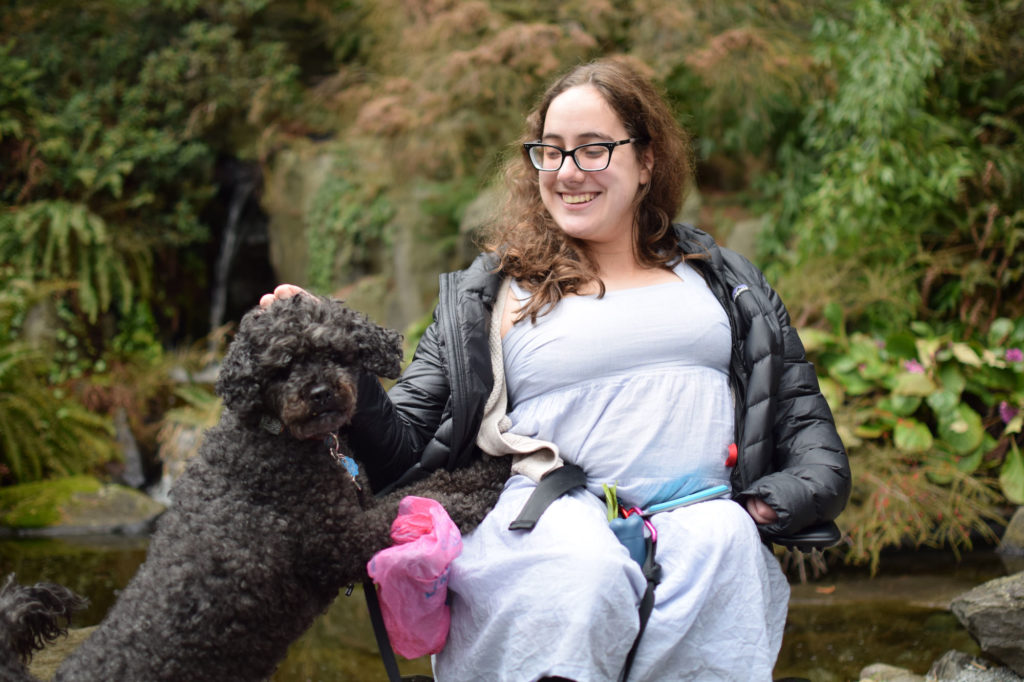During your next airport visit, you may see some ponies and potbelly pigs in your security checkpoint lines due to the new guidelines for service and comfort animals. However, last month at the New Jersey airport a “service peacock” was not cleared for take off.
Although it’s easy to laugh off, this kind of reaction by able-bodied people for service animals making headlines can put others with disabilities at risk of being taken seriously.
“There is no law that says your service animal has to be identified… however, a lot of people do try to bring service animals or false emotional support animals. There’s still a lot of stigma,” said senior Mirella Galang.
Galang is the owner of Paco, her own purse-sized service dog. A service dog, as de ned by the American Disabilities Association (ADA), “means any dog that is individually trained to do work or perform tasks for the benefit of an individual with a disability.”
Under the ADA, colleges and universities must allow people with disabilities to bring their service animals into all areas of the facility that are open to the public or to students. Service dogs are not required to have any contact with Disabilities Services (DS), as they are considered an access need.
“When I was working for Housing and Residence Life (HRL), they didn’t want me to bring [Paco] to certain meetings, saying he was a distractions,” Galang said. “Without saying it, they [seemed to be saying] ‘You’re distracting everyone with your disability. You can’t cope with your disability here because his collar is too loud or people think he’s cute and people can’t control themselves,’ like around my disability and my animal that’s supporting me in that disability. It’s just a lot of pressure to be a certain way when I’m already trying to deal with anxiety and panic attacks. So that’s really why I have Paco.”
Galang has recently resigned from her Resident Assistant (RA) position for HRL.
“All of my residents loved Paco. It was always a starting point for conversations. Because of Paco and because people love dogs on this campus, I get to start a lot of great conversations about mental health,” Galang said.
Paco accompanies Galang to class and work. The prosecutors at Galang’s work have helped empower her with laws on discrimination and her disability needs.
“I didn’t know [the procedure of service animals] until the people at my work told me the law around it. Disabilities Services just said, ‘Get a doctor’s note.’ I had to figure it out as I went along instead of having all the options to choose from,” Galang said.
Galang said that her professors have been open, caring and compassionate to herself and her little pal, Paco. As a senior Humanities for Teaching major, Galang has learned how to be there for her own students one day.
An Emotional Support Animal (ESA) must be requested or approved for HRL by DS. All the proper steps must be taken by the student before the animal arrives on campus.
Junior Jordan Ayers is new to living and studying on-campus with her ESA.
“Over the summer I struggled with severe depression and anxiety, and partly the reason I got my dog was to have someone that needed me…she plays a bigger role than she can ever understand,” Ayers said.
Susan, who is Ayers’s emotional support animal, is allowed in on- campus grounds and buildings, but only certified service dogs are allowed to come to class with their owners.
“All my professors love her, like whenever I come into office hours. She’s just such a calming presence,” Ayers said.
Ayers is also an employee of Seattle U’s Writing Center, and her clients also benefit from Susan. “She is a very calming presence to my clients just to have her there. It’s so good. She emotionally supports a lot of people.”
Students must make an appointment with DS, be approved for an “ESA for residence,” and then make an appointment with Housing and Residence Life to review animal care. The final approval for an ESA comes when a vet report showing the animal’s vaccination and good health, as well as the animal care expectations, are shared with DS.
“I have heard so many amazing things [about service animals],” RA for the Murphy Apartments, Anjani Ludu, said. “As far as the policies, I heard it can be really difficult to schedule [an emotional support animal], as far as getting all your documentation in. It can take a couple months in some instances if you’re not on top of it beforehand… it’s just to make sure it’s as safe as possible for everyone.”
In the greater Seattle area, laws prohibit employment and housing discrimination based on disability. Landlords are required to provide reasonable accommodation, like a waiver, a no-pet rule or a pet deposit, since service animals or emotional support animals are not considered to be a pet.
“I have tried everything else for my anxiety, and this was kind of the last resort.” Galang said. “Be honest with yourself and your doctor…to help you find the right needs.”
Jacqueline may be reached at
[email protected]













